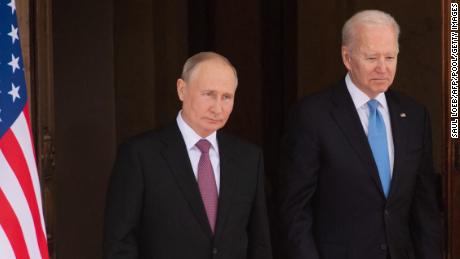
Washington – President Joe Biden will hold a call with Russian President Vladimir Putin on Tuesday in what is expected to be a highly consequential meeting for the two leaders amid escalating tensions between Russia and Ukraine.
In the last several months, Russia has erected supply lines, including medical units and fuel, that could sustain a drawn-out conflict should Moscow choose to invade, two sources familiar with the latest intelligence assessments told CNN. And recent US intelligence findings estimate Russia could begin a military offensive in Ukraine in a matter of months as it amasses up to 175,000 troops along the border.
In what could be one of the most pivotal foreign policy meetings of Biden’s still-young presidency, the President is expected to lay out to Putin what sanctions and other actions the US could take if the Russian President decides to invade Ukraine. The US intelligence community believes Putin has still not made up his mind to launch a military offensive against Ukraine, and Biden plans to tell Putin the US is prepared to take “substantive economic countermeasures” meant to inflict “significant and severe economic harm on the Rus
sian economy” should Putin go ahead with a military escalation in Ukraine, a senior administration official told reporters Monday.
According to a White House preview of the call, “The leaders will discuss a range of topics in the US-Russia relationship, including strategic stability, cyber, and regional issues. President Biden will underscore US concerns with Russian military activities on the border with Ukraine and reaffirm the United States’ support for the sovereignty and territorial integrity of Ukraine.”
Kremlin spokesman Dmitry Peskov said on Monday that talks between Biden and Putin will take place via a secure video link “behind closed doors.”
“There will be no live broadcast. I think we will show the very beginning of the meeting. The very beginning will be broadcast, the entire meeting will be held behind closed doors,” he said, according to Russian state news agency Tass.
“We believe that it will be sufficiently extensive and lengthy video conference held via a secured communication channel. We expect it to be a long one,” Peskov added.
The two leaders took part in a summit in Geneva last June. Their last publicly known call was in July.
A day ahead of the US-Russia call, the Pentagon confirmed that it has continued to observe “added military capability” by Russian forces along the country’s border with Ukraine.
“What we continue to see, and what we continue to see is added capability that President Putin continues to add, added military capability in the western part of his country and around Ukraine,” Pentagon spokesman John Kirby said.
US officials in recent days have weighed whether to issue wide-reaching sanctions on Russia meant to deter Putin from launching an invasion into Ukraine.
They include new actions against members of Putin’s inner circle and on Russian energy producers, and one potential “nuclear option” — disconnecting Russia from the SWIFT international payment system used by banks around the world.
The officials said final decisions hadn’t been made on whether and when to apply the new sanctions, and said the Biden administration is currently in talks with European partners — many of whom have closer economic relationships to Russia — in the hopes of coordinating action.
The administration is also exploring options for a potential evacuation of US citizens from Ukraine if Russia were to invade the country and create a dire security situation, half a dozen sources tell CNN.
The contingency planning is being led by the Pentagon, the sources said, and comes as the administration briefs Congress on how the US is preparing. In a “gloomy” briefing to senators by senior State Department official Victoria Nuland on Monday night, Nuland outlined the tough sanctions package being prepared by the administration in response to a potential Russian attack but acknowledged that the US’ options to deter an invasion are fairly limited, a person familiar with the briefing said.
White House press secretary Jen Psaki said during Monday’s press briefing that Biden “will be clear — as we have conveyed publicly — that we have been preparing a range of economic sanctions or economic options that could have a detrimental impact on the Russian economy.”
Putin relayed last week that he would call for specific agreements that would rule out any further NATO expansion eastward and deployment of its weaponry close to Russia’s borders. Should Putin tell Biden on Tuesday that NATO must not admit Ukraine as a member — as he is expected to do — Biden is not likely to accede to the demand.
Biden held a call with European allies Monday night to discuss “their shared concern about the Russian military build-up on Ukraine’s borders and Russia’s increasingly harsh rhetoric,” according to a White House statement.
The leaders on the call — which included French President Emmanuel Macron, German Chancellor Angela Merkel, Italian Prime Minister Mario Draghi and UK Prime Minister Boris Johnson — called on Russia to deescalate tensions and voiced support for Ukraine’s sovereignty. The White House statement says the leaders “will stay in close touch, including in consultation with NATO allies and EU partners, on a coordinated and comprehensive approach.”
A senior administration official said this week that the US has engaged in “intensive discussions with our European partners about what we would do collectively in the event of a major Russian military escalation.”
Secretary of State Antony Blinken spoke with Ukrainian President Volodymyr Zelensky on Monday ahead of the US-Russia call. A senior administration official also said that Blinken would speak Zelensky before that meeting, and Biden would speak with the Ukrainian leader “in the days following the call” and will “consult closely” with him.
As reported by CNN
